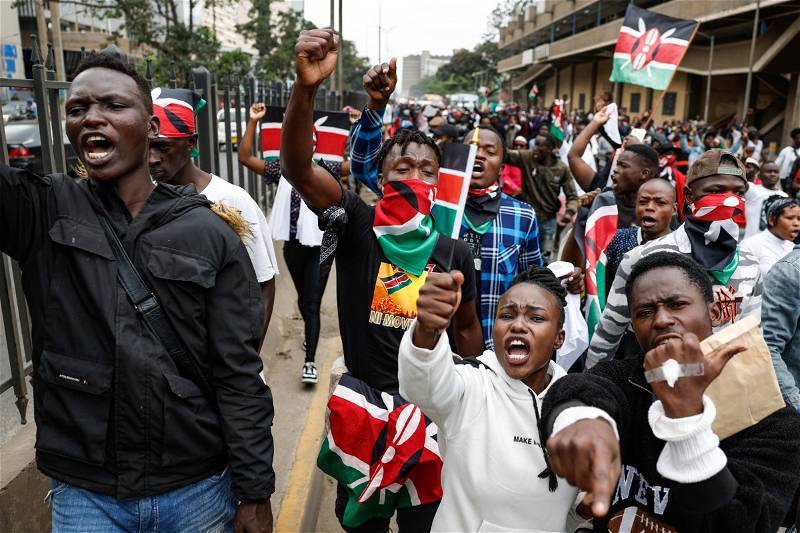Never in the history of the tourist East African country of Kenya has there been any protest since the Mau-Mau Uprising in the colonial era like what Kenya witnessed the penultimate week when Kenya youths under the aegis of what is code named Generation-Z protested against tax hike as the Parliament debate the new Finance Bill 2024 presented by President William Ruto.
The controversial tax proposal was alleged to have been the IMF agenda to pauperize the already encumbered Kenya citizens reeling under the throes of a weak economy and make money available to government to service its external debt burden.
What began as a protest on June 18 in Nairobi Central Business District spread to Kisumu, Mombasa, Kakamega, Nakuru, Kericho and other cities in Kenya. The movement grew organically and with intensity and on June 25th 2024, the protesters surrounded the Kenya’s Parliamentary Building and vandalized it. And soon after, as is characteristic of African states, the government moved in with force to stop the protest resulting in many casualties; the death of 14 people was reported while scores of others sustained various degrees of injuries including over 200 arrests by the police.
But despite the killing of protesters, the arrest of activists, bloggers, social media influencers and attempt to infiltrate the protesters to create confusion and cause mayhem, the protesters were not deterred. Then on the 26th of June after almost ten days of protest, President William Ruto backed down and announced the withdrawal of the controversial bill.
What happened in Kenya is much more than a mere protest. It is a revolution. It is a reflection of what civic responsibility should be. It shows that when the people are united they can achieve their goals. African leaders and unscrupulous politicians know this fact and that is why they use many crude and subtle tactics to keep the people perpetually divided so that they will continue to have their way.
The Kenya Generation-Z demonstrated that the ultimate power in a democracy belongs to the people. They demonstrated that there is a limit to human manipulations. This is what civic responsibility is all about. It is holding leaders accountable. It is about positive followership. The government is for the people and there is right to civil disobedience when the government is going contrary to the will of the people.
In Nigeria, there was a similar popular uprising in 2020 code-named EndSARS. But the protest failed because there was official infiltration into the ranks of the protesters. Nigeria is a nation that is sharply divided along ethnic and religious lines. Added to that is the fact that the government is also using poverty and ignorance as weapons to manipulate the people. Nigeria has remained in disarray because the citizens have refused to hold their leaders accountable. What sparked the protest in Kenya is not up to 1% of the economic crimes committed against Nigerians since the coming of the All Progressives Congress (APC) regime in Nigeria and yet the Nigerians carry on as if nothing has happened.
In Nigeria, the pump price of the petroleum price has increased, VAT rate has increased, electricity tariff has increased, tax rate and other rates but government refused to increase wages. The foreign exchange rate is bastardized, the foreign debt is mounting, unemployment and inflation rate galloping to the sky and government ask the people to be patient while they indulge in frivolities and luxury. The people have refused to fight for their inalienable rights and have allowed unscrupulous politicians to ride roughshod on them. Nigerian followership has been docile. Elsewhere in some African countries from Cameroun, Equatorial Guinea, Uganda, Togo and others it is a story of sit-tight leaders that see government a family dynasty while the people watch helplessly.
There is a limit to tyranny and executive rascality and it is the duty of the people to call their supposed elected leaders to order. The people have the power and the tools but in most cases they fail to utilize these tools at their disposal thereby indirectly creating tyrants and oppressors. The people should be educated about their rights, duties and obligations to the state. They must know that political leaders are representatives who should serve the people and not lords of the manor. The moment they get this consciousness, then they will begin to hold their leaders accountable. And they will not be distracted by ethnicity and primordial sentiments.
Clearly, the Generation-Z Uprising in Kenya is a wake-up call to other African countries. It is warning signal for the insensitive African leaders that regale in bringing economic burden on the citizens while they live in opulence at the expense of the tax payers. Those in authority must know that they are holding power in trust for the people. They are accountable to the people.
However, the fact that the Kenyan authority bulk down on the vexed bill may not be an indication of responsiveness on the side of the government as some insinuated but that of a government that is reactionary; an indication of the crudity of African leaders that wait for nuisance value before they do the right things. It is a measure of recklessness and insensitivity of African leadership. Leaders must engage their people; get their input in the decision-making process. Government policies should benefit the people and promote common good.
Hajia Hadiza Muhammed



